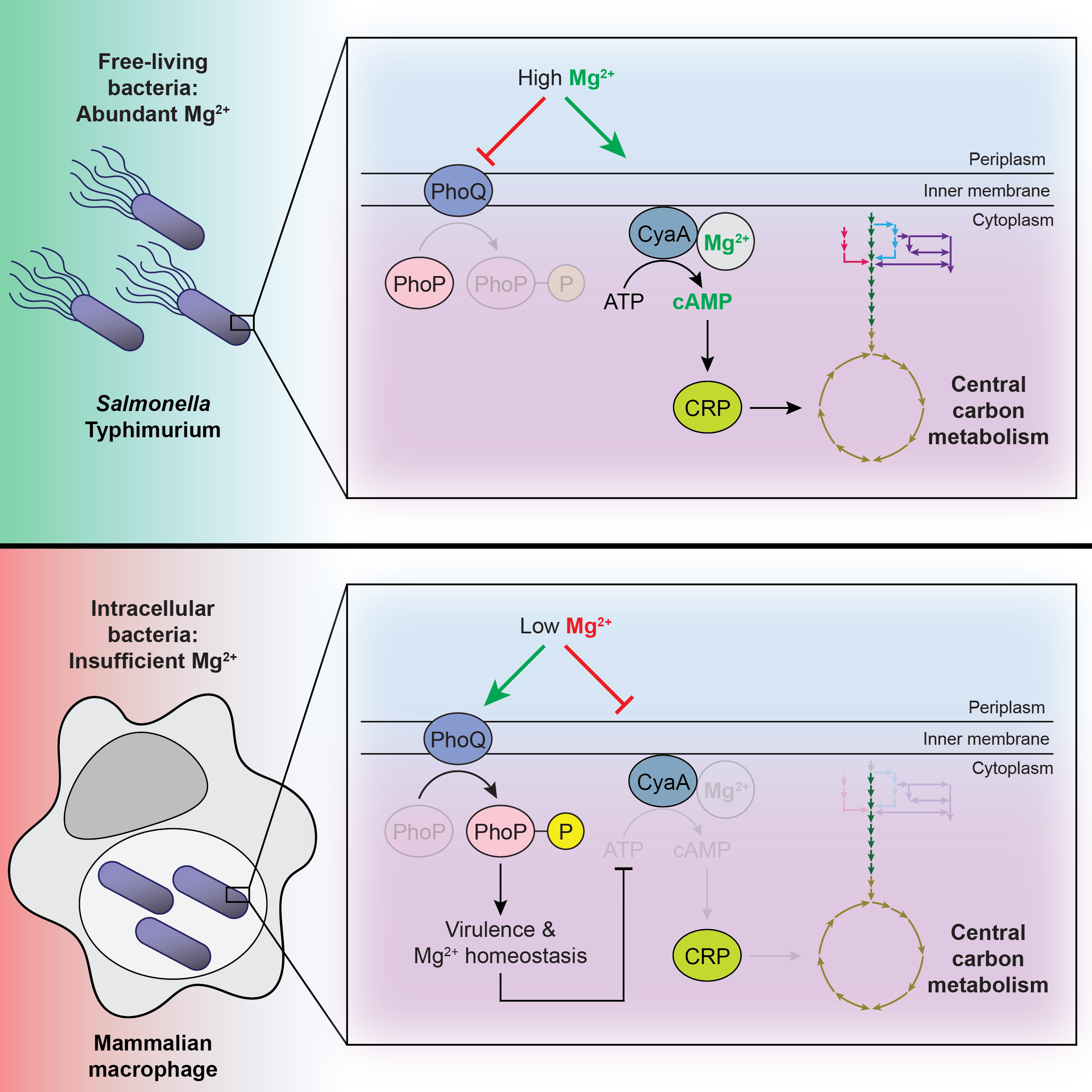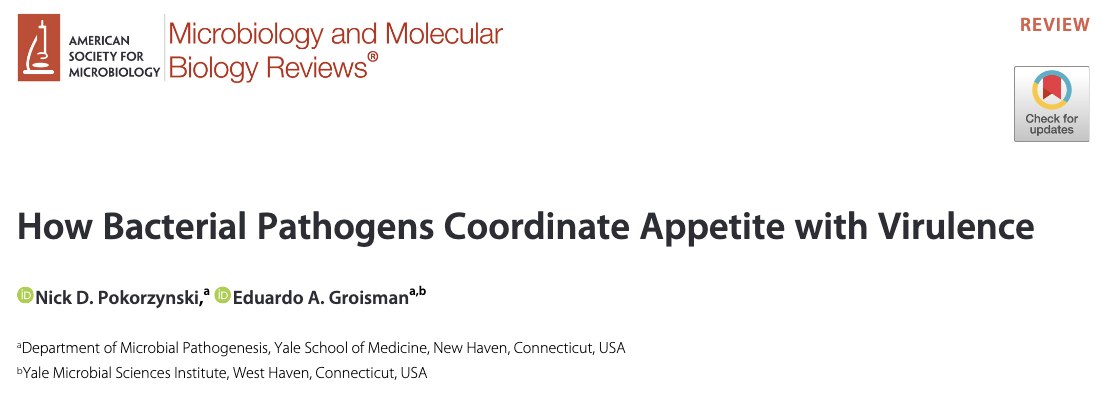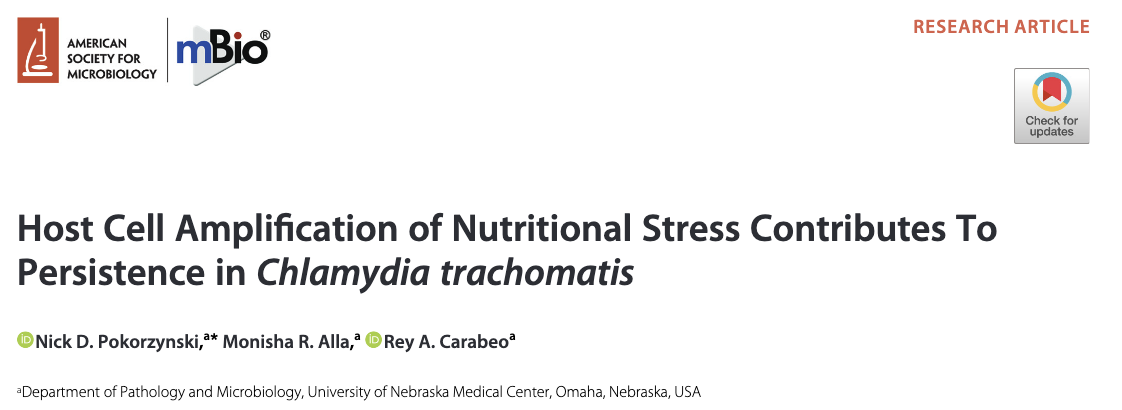Hello! I’m Nick (he/him), currently a postdoctoral research associate in Eduardo Groisman’s laboratory in the Department of Microbial Pathogenesis at the Yale School of Medicine. I will start my independent laboratory in the Department of Microbiology at Oregon State University in Sept. 2025.
I am interested in using genetics, biochemistry, and systems biology to understand how bacterial pathogens alter their physiology to survive in mammalian hosts and cause disease. I approach this subject by interrogating the metabolic basis of traits that promote bacterial virulence.
I received my Ph.D. in Rey Carabeo’s laboratory at Washington State University, where I studied the transcriptional and post-transcriptional stress response mechanisms of the obligately intracellular bacterial pathogen, Chlamydia trachomatis.
Read on below to learn more about my current research and future plans.
Use these links to follow me on Twitter (begrudgingly, X), LinkedIn, Google Scholar, and ORCiD
Current Research
In the Groisman laboratory, I have focused on how the enteric bacterial pathogen, Salmonella enterica serovar Typhimurium (S. Typhimurium), adapts its metabolism to infection-relevant conditions.
The carbon sources cells consume dictate metabolism, so long as the nutritional cofactors required to operate metabolic pathways are present in sufficient abundance. How, then, do cells alter their metabolism when these cofactors are absent?
Magnesium (Mg2+) is the most abundant divalent cation in living cells. When S. Typhimurium resides within mammalian cells, it competes with the host cell for Mg2+. I have found that low cytoplasmic Mg2+ profoundly alters the metabolism of S. Typhimurium, limiting the physiological states this bacterium can adopt in host tissues.
This metabolic reprogramming arises due to diminished synthesis of a central signaling molecule, cyclic adenosine monophosphate (cAMP), the allosteric activator of the key metabolic regulator, the cAMP receptor protein (CRP). The master virulence regulator PhoP controls cAMP synthesis by governing the amount of the cAMP precursor, adenosine triphosphate (ATP). These findings challenge decades of research in the field of microbial metabolism by identifying Mg2+ as a predominant regulator of CRP-cAMP activity and have important implications for the behavior of S. Typhimurium in host cells.
Future Research
I plan to expand on the foundation I have established as a postdoctoral research associate in my independent laboratory.
In the immediate term, I am interested in studying the consequences of reduced cAMP abundance on the regulatory activity of CRP. For example, why are some CRP-cAMP-regulated genes transcriptionally activated in low cytoplasmic Mg2+ despite reduced cAMP amounts? Do these genes have particularly important roles in the adaptation of S. Typhimurium to the host cell environment? In addition, I aim to delineate the molecular mechanisms underpinning the reduced abundance of cAMP. The amount of cAMP in the cell is controlled by synthesis, turnover, and excretion into the extracellular environment. How each of these facets contribute to the total intracellular concentration of cAMP stands to influence the metabolic activity of S. Typhimurium in mammalian hosts.
In the long term, I plan to expand my research program to understand a variety of processes controlled by low cytoplasmic Mg2+: the control of carbohydrate uptake by proteolysis; the metabolic basis of various virulence-associated traits such as the synthesis of cellulose, peptidoglycan, and lipopolysaccharide; the regulation of S. Typhimurium metabolism by factors other than CRP-cAMP; hierarchical carbohydrate utilization in host environments; and the host-determinants of carbon source utilization by intracellular S. Typhimurium.
Scientific Philosophy
I approach my science from a philosophical viewpoint that understands biology as the complex ensemble of innumerable relationships, many of which appear in contradiction with one another. By approaching these instances of apparent contradiction and attempting to resolve them through experimentation, new aspects of biology can be uncovered. I am also committed to the generative potential of error in science. That is, only through the practice of science, and the uncovering of errors and misconceptions, does science continue to advance.
Publication Gallery
Click the images below to be directed to the publication website!
Pedagogical Philosophy
Formal education is a critical component of a comprehensive scientific training. However, for students to fully grasp science as a discipline, rather than as an abstract set of theories, education must be practical. That is, education must engage pupils in the practical activity of doing science. How can educators accomplish this in a world of finite time and resources?
Two pivotal educational experiences shaped my pedagogical philosophy: the first was teaching a practical laboratory course, and the second was as a student in a flipped-classroom, active-learning biochemistry lecture course. Both courses emphasized the practical engagement of students in the content of the course. Not only does this transform science into a living body of knowledge that can continue to grow and change, but by promoting social interaction between students, it also helps to break down systemic barriers between students. In other words, by learning actively and by learning together, students can better comprehend the material and walk away from the classroom with a deeper appreciation for science as a discipline.
Approach to Mentorship
Mentorship can significantly shape a trainee’s perception of science and the academy. The mentorship I have received in the Carabeo and Groisman labs has convinced me of the value of dedicated mentorship. I believe that mentorship must start from developing meaningful professional relationships with trainees that take into account their particular interests, needs, aspirations, and personal or professional goals. I do not view mentorship in a hierarchical sense, one where the trainee is a subordinate, but rather as an intellectual collaboration between myself and a prospective trainee. This means that there is no “one-size-fits-all” approach to mentorship; mentorship should fit the person and the project, and trainees should not be expected to “adapt” to the mentorship style of their advisor. I have had the pleasure of mentoring many undergraduate and graduate students in the lab, from a wide range of backgrounds. In each case, I have elevated trainees based on their particular strengths, while challenging them in ways that help them develop new skills. This helps to produce rigorous, creative, and well-rounded scientists able to tackle whatever challenges come their way.
Commitment to Diversity and Inclusivity
No matter the background of a student or trainee, they should feel welcome in every research and educational environment. To guarantee this in a field that has historically ignored or excluded the contributions of those with marginalized identities requires adopting policies and practices that work to reverse this trend. For example, recruiting and retaining diverse graduate students requires dedicated efforts to make sure that academic departments prioritize the needs of trainees with marginalized backgrounds. I am committed to fostering an inviting and inclusive research program that takes the necessary steps to meet the needs of trainees and students, whatever their background. I believe that my research program will succeed by recruiting diverse trainees who can offer new insight and perspectives on projects in the lab. Diversity and inclusion must also be promoted in the spaces that orbit the academy, such as conferences and workshops. In 2025, I will chair the Mechanisms of Microbial Transcription Gordon Research Seminar, with the explicit goal of increasing diversity in a conference that, historically, has not been well-attended by underrepresented individuals. To this end, I am prioritizing the invitation of younger, more diverse candidates to provide keynote seminars and serve on career panels for the benefit of the trainees in attendance.
Outside of the Laboratory
I live in New Haven, Connecticut with my partner of four years and my two dogs (both of whom are named Archie - I promise I can explain!). I enjoy traveling to new cities and exploring bookstores, coffee shops, dive bars, restaurants, and hiking trails. I am also a fan of offbeat comedy, live music, and art and history museums.
I grew up in Michigan, but I have since lived in Iowa, California, Washington, and Nebraska, before moving to Connecticut.
I have helped establish several science policy organizations in graduate school and as a postdoc, to translate scientific results into meaningful public policy.











